The customer is always right.
I'm sure you've heard this before as the golden rule of business.
But what this rule doesn't encompass is the customer experience.
The saying should be:
always put the customer first.
You may have certain operations and practices in place to make things easy and cost-effective for your company, but how does this impact the customer journey?
If you're saving a few bucks or some extra time at the expense of the customer experience, it'll backfire.
Instead, everything you do needs to center around creating an optimal customer experience.
You think about your business 24 hours a day, 365 days per year. But the reality is, your customers have more important things to worry about.
Their time is valuable.
They want to give you money, but not if it's going to take too much time out of their day.
You need to simplify your conversion processes. Start focusing on making everything as easy as possible for the customer.
These are some of the short and long-term benefits of improving the customer experience:
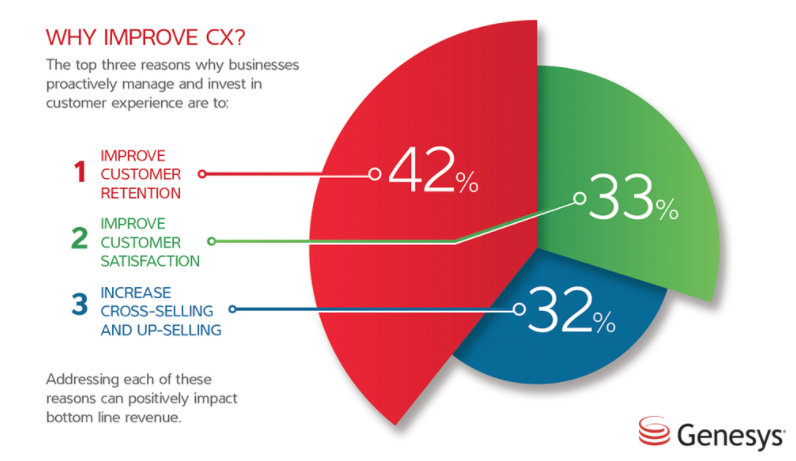
Here's the thing.
You may be an expert in digital marketing tactics.
But driving customers to your business through marketing channels, like your website, social media platform, and email marketing tactics, is only half the battle.
Once you get people through your doors or to your landing page, their experience from that point on will determine how much money they'll spend at your business.
In this post, I'll explain how you can boost your revenue by focusing on the customer experience.
Put yourself in your customers' shoes for a minute.
Think about some of the reasons why they would need to contact your customer support teams.
Perhaps, they:
For the most part, these reasons tell us your customer is having a negative experience doing something.
Who knows how much time they spent trying to resolve it on their own before reaching out to a representative from your company.
It's safe to say they could be pretty frustrated.
You need to give them lots of options to reach a customer service representative.
While receiving phone calls from 9:00 AM to 5:00 PM, Monday through Friday, may be the easiest and most cost-efficient solution for your company, that doesn't work for all your customers.
This is how consumers want to reach customer support:

As you can see from the data, the answers are all over the board.
Most customers prefer phone; others like web chats or email; and some want automated responses.
Some customers don't even care—they just want to get in touch with someone.
The process needs to be:
I'm sure you've been through this before.
You call a customer service number just to wait on hold for what seems like an eternity.
When someone finally answers the phone, you explain your situation, and they transfer you to another department.
You wait on hold again and have to re-explain everything to another person.
This is not effective.
If this sounds like your customer support process, it's definitely hurting your bottom line.
Adding multiple support options that deliver fast service will keep your customers happy, especially if they were experiencing some frustration before they reached out.
Now you won't have to worry about losing that customer.
Customer service starts at the top of the chain.
As a business owner, you need to realize that your attitude about customer service will impact how your managers and supervisors approach the topic.
This is true even if you're not the one who has direct contact with the customers.
Whether you're a small local business or global chain, every member of your staff needs to understand the importance of customer service.
One bad experience with a part-time employee can deter someone from ever spending money at your company again.
Take a look at what consumers value the most when it comes to customer service:

The majority of these options involve your staff.
I realize it's not easy to run a business.
Depending on the size of your company, you may not even know the names of every employee.
That's why it's important to create a company culture in which poor customer service is not tolerated.
Little things can go a long way.
If your customers have face-to-face interactions with your staff, make sure your staff are trained to smile and greet customers as they come through the door.
If your staff act like they want to be there, the customers will pick up on that energy.
But if your customer service representatives are giving off the impression they don't care, the customer won't be happy.
You can't afford to lose any customers.
How often do you work on optimizing your website?
If you built your site when you first started your business and never touched it again, I'm willing to bet it could use some improvements.
The highest converting websites have one thing in common.
Simplicity.
Websites with simple designs have higher conversion rates.
Don't overwhelm your visitors.
If you have a variety of flashing lights, buttons, menus, advertisements, and images, you confuse your site visitors.
Make sure you don't have many long paragraphs or messy text on your website.
Your text should be large and easy to read.
Replace anything that's messy with a couple of high quality visuals.
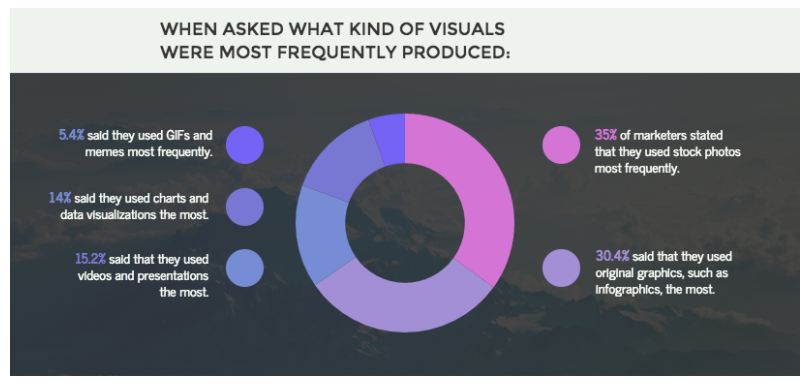
Visual explanations are easier for people to comprehend and retain.
Design your website so that the visitor's eyes and attention get drawn to your CTA buttons.
For those of you with an ecommerce website, don't try to fit 1,000 products on your home page.
Instead, focus on your top selling items or the ones with the highest margins.
In a perfect world, those products are the same.
Your navigation menu shouldn't be complicated either.
For example, let's say you're selling clothing.
Don't have options like this on your menu:
Instead, have one category: "Tops."
Have a search menu to give people an option to look for products directly instead of using your menu.
You can offer options to refine their search based on subcategories.
When it's easy for customers to find what they want on your website, there's a greater chance they'll spend money.
In addition to a simple website design, your site needs to load fast.
I'm not just talking about your home page. Every page needs to be quick.
Look at how much of an impact page loading time has on conversions:
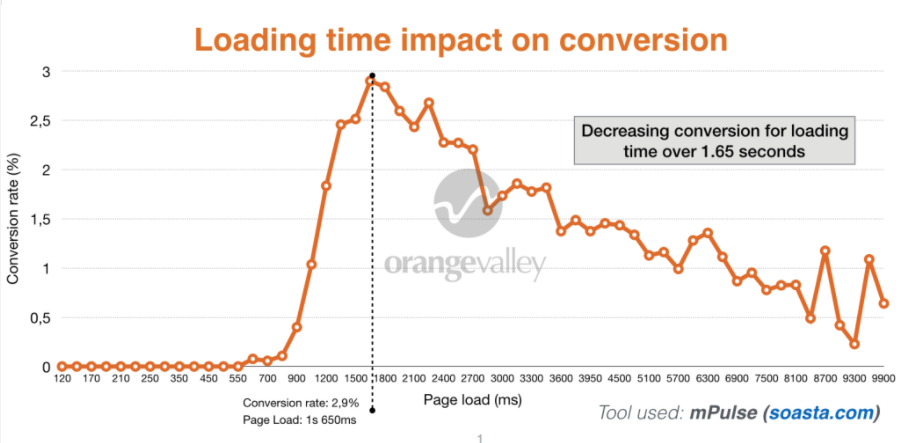
Websites that load slowly convert less. It's that simple.
Remember what I said earlier? Your customers' time is valuable.
If your website is crashing or not loading fast enough, people won't put up with it.
They'll visit one of your competitors' websites instead to find what they're looking for.
Not sure how fast your site loads?
Use some free online tools like the Pingdom website speed test.
You can check how fast your site loads from different locations across the globe.
If your site isn't loading fast, figure out the root of the problem.
It's possible you might need to upgrade your existing web hosting service plan or change providers.
While this may cost you more money, it will improve the customer experience and generate more revenue in the long run.
Trust me, it's worth it.
You need to accommodate customers using various devices to access your website and make purchases.
It's essential your site is mobile friendly.
You could also create an app for your brand for an even more optimal user experience.
Take a look at how mobile phones are trending in terms of web traffic:

Half of the global web traffic now comes from mobile devices.
That number will only continue to rise.
While mobile phones trend up, laptop and desktop devices are trending down.
Realize this is how your customers are consuming data.
Don't neglect your customers who like to shop and navigate online from their smartphones.
Consumers love phones because they are convenient.
Doesn't it seem like cell phones are glued to everyone's hands, wherever you go?
If your customer wants something, it's easier for them to do it from their phone instead of waiting until they are in front of a computer.
You're missing out on revenue if your site isn't mobile optimized.
Let's look at the impact of a mobile-friendly website on consumer buying behavior:
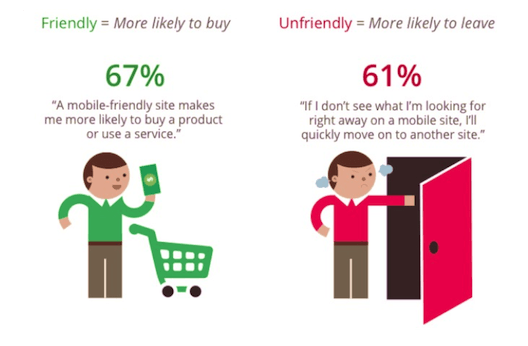
This is extremely important for anyone who has an ecommerce store.
But even if you're not selling physical products online, you still need to give your customers easy access to find information about your business from their phones.
Ultimately, this will lead to higher conversion rates.
Everyone wants a deal.
Some luxury brands can get away with never putting anything on sale, but if you're trying to compete with the majority of the market share, I wouldn't recommend that strategy.
Give your customers an incentive to buy from you instead of your competition.
It's rare for a brand to offer a product that can't be found elsewhere.
Most likely, your competitors have similar products, and in some cases, they're selling the exact same thing.
Customers aren't stupid.
They're going to do some research before they buy something.
More often than not, they'll pick the least expensive option.
Retailers are much more likely to make a sale if they offer a discount or promotional code:
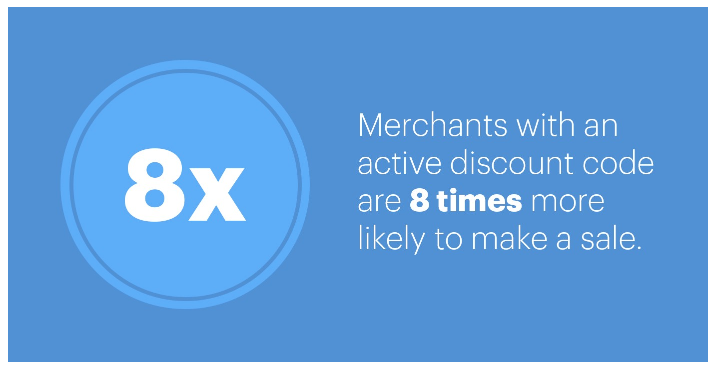
Let's take a look at Shopify.
They are a major ecommerce brand with merchants selling different types of products.
Over the last year, 17% of all sales on their platform had a discount code in the transaction.
I'm not saying you need to give everything away.
Don't discount in a way that will hurt your bottom line.
Alternatively, offer a rewards program to your customers: when they spend a certain amount over a period time, they get some sort of benefit.
They'll feel satisfied after they reach a certain status level, which will keep them happy.
It'll also encourage them to spend more money.
That's why I recommend implementing this strategy to improve the customer experience.
Go through each step of your checkout process.
How many different ways can customers make a purchase?
That includes:
Whether you have one or more of these options, the checkout process needs to be as easy as possible.
If you have an ecommerce website, are you noticing an increase in shopping cart abandonment?
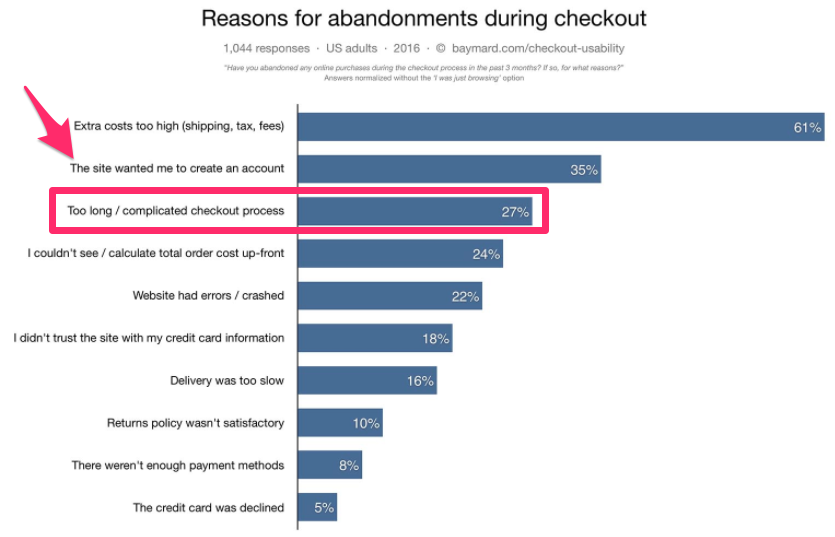
Look at the top three reasons on this list.
After extra costs, the second and third top reasons have to do with a checkout process that's not optimized.
You shouldn't force your customers to create an online account just to make a purchase.
Why?
It's too long.
Imagine this. Your customer wants to buy something. They've made a decision about their purchase.
Don't give them an excuse to back out.
The checkout procedure should ideally be just a few clicks.
Don't ask for too much information. Just get the essentials.
With every additional step in your checkout process, you risk losing the sale.
Again, your customers' time is valuable.
You'll get higher conversions and make more money if you don't waste their time.
You need to focus your business operations on optimizing the customer experience.
These changes may not always be the most convenient and cost-effective for your company, but they're necessary.
Prove to your customers you value their patronage and time by making things as easy as possible for them.
When it comes to customer support, give them as many options as possible to contact a representative.
Make sure every person on your staff realizes how important their attitude is when it comes to handling customer service inquiries.
Your website should have a clean navigation, and every page needs to load fast.
Don't forget about mobile users.
Offer discounts, rewards, and other promotions.
Simplify your checkout process to make it easy for customers to buy something without having to provide much information.


